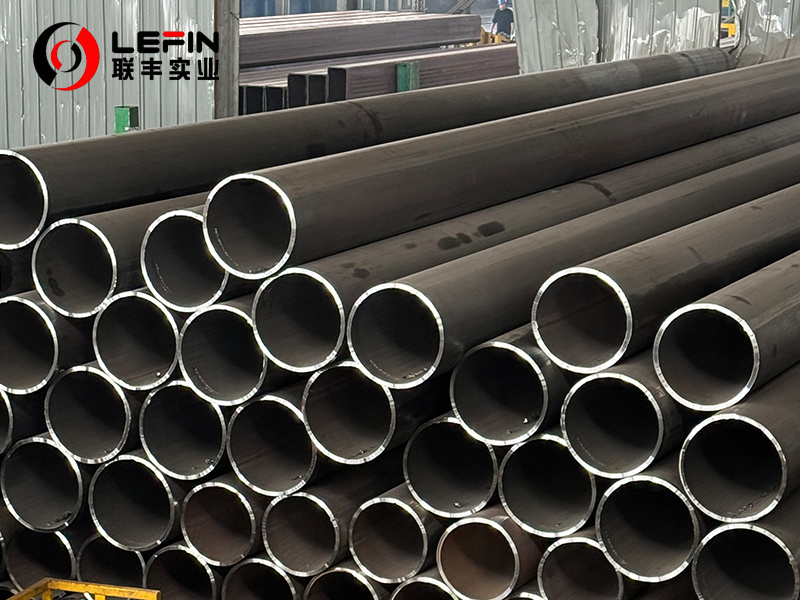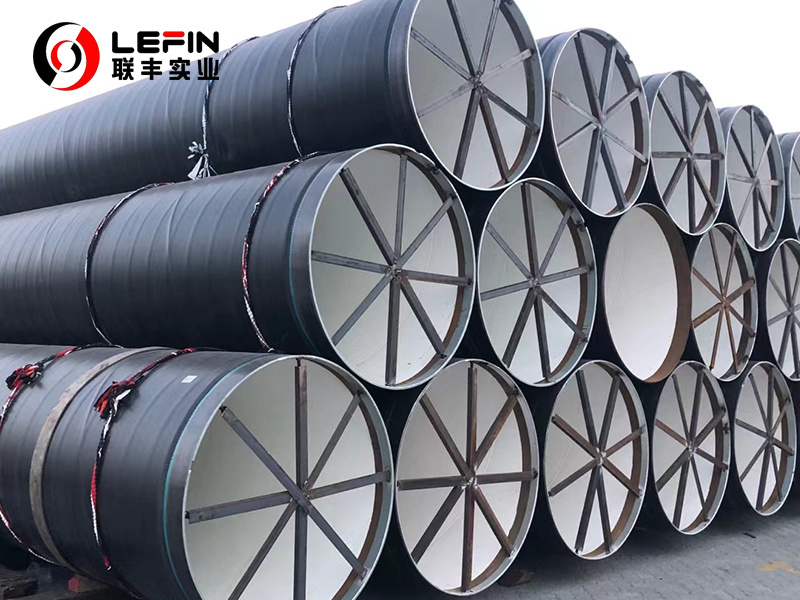
- Details
-
Spiral tubes play a significant role in multiple industrial fields due to their unique manufacturing process and structure.
Core features
• Manufacturing process:
It adopts a spiral winding forming process and usually uses double-sided submerged arc welding technology.
• Structural characteristics:
The continuous spiral weld seams make the force distribution more uniform and the overall structure stable.
• Materials and Specifications:
Different materials (such as Q235A, Q345, L245, etc.) can be used, with a wide range of diameters and adjustable wall thickness. It can produce large-diameter steel pipes from relatively narrow steel strips.
Main advantages
• High strength:
The stress of spiral welds is less than that of straight welds, with strong pressure-bearing capacity, good resistance to deformation and seismic performance.
• Good economic performance:
High material utilization rate, flexible production, which can reduce losses and costs. - Strong durability: It has excellent corrosion resistance and fatigue resistance, and a long service life.
• Easy to install:
It is relatively light in weight and has various connection methods (welding, clamps, etc.), making it convenient for transportation and installation.

Typical applications
• Fluid transportation:
Long-distance pipelines for oil, natural gas, water supply, drainage, etc.
• Structural support:
Large-scale buildings, Bridges, docks, pile driving pipes and other engineering structures.
• Special environments:
Transportation of corrosive media in the chemical industry, protection pipes for power cables, etc.
💡 Selection and usage suggestions
After understanding the overall situation of spiral tubes, there are still several key points worth paying attention to when selecting and using them in actual projects:
• Focus on standards and quality:
Spiral tubes have different execution standards (such as national standard GB/T9711, Ministry standard SY/T5037, American Petroleum Institute standard API-5L, etc.). When making a purchase, it is necessary to clearly define the standard grade required by the project and pay attention to whether the manufacturer provides complete quality certification documents such as hydrostatic tests and non-destructive testing of welds.
• Emphasize anti-corrosion treatment:
It is crucial to select the appropriate anti-corrosion treatment based on the usage environment (such as underground, underwater, or in chemical industrial areas). Common methods include 3PE anti-corrosion (three-layer polyethylene), epoxy powder coating, cement mortar lining, etc., which can greatly extend the service life of the pipeline.
• Consider professional application details:
In some specific applications, there are more detailed requirements. For instance, in bridge engineering, detailed parameters for wind load resistance and seismic resistance may be of concern. In circulating water systems or sewage treatment, the smoothness of the inner wall has a significant impact on reducing fluid resistance and preventing scaling.
💎 Summary
Overall, spiral tubes have become indispensable key materials in modern infrastructure due to their excellent mechanical properties, economy and environmental adaptability.

Spiral Tubes Have Their Characteristics And Applications
Subcategory
Keyword
- Details
-
Spiral tubes play a significant role in multiple industrial fields due to their unique manufacturing process and structure.
Core features
• Manufacturing process:
It adopts a spiral winding forming process and usually uses double-sided submerged arc welding technology.
• Structural characteristics:
The continuous spiral weld seams make the force distribution more uniform and the overall structure stable.
• Materials and Specifications:
Different materials (such as Q235A, Q345, L245, etc.) can be used, with a wide range of diameters and adjustable wall thickness. It can produce large-diameter steel pipes from relatively narrow steel strips.
Main advantages
• High strength:
The stress of spiral welds is less than that of straight welds, with strong pressure-bearing capacity, good resistance to deformation and seismic performance.
• Good economic performance:
High material utilization rate, flexible production, which can reduce losses and costs. - Strong durability: It has excellent corrosion resistance and fatigue resistance, and a long service life.
• Easy to install:
It is relatively light in weight and has various connection methods (welding, clamps, etc.), making it convenient for transportation and installation.

Typical applications
• Fluid transportation:
Long-distance pipelines for oil, natural gas, water supply, drainage, etc.
• Structural support:
Large-scale buildings, Bridges, docks, pile driving pipes and other engineering structures.
• Special environments:
Transportation of corrosive media in the chemical industry, protection pipes for power cables, etc.
💡 Selection and usage suggestions
After understanding the overall situation of spiral tubes, there are still several key points worth paying attention to when selecting and using them in actual projects:
• Focus on standards and quality:
Spiral tubes have different execution standards (such as national standard GB/T9711, Ministry standard SY/T5037, American Petroleum Institute standard API-5L, etc.). When making a purchase, it is necessary to clearly define the standard grade required by the project and pay attention to whether the manufacturer provides complete quality certification documents such as hydrostatic tests and non-destructive testing of welds.
• Emphasize anti-corrosion treatment:
It is crucial to select the appropriate anti-corrosion treatment based on the usage environment (such as underground, underwater, or in chemical industrial areas). Common methods include 3PE anti-corrosion (three-layer polyethylene), epoxy powder coating, cement mortar lining, etc., which can greatly extend the service life of the pipeline.
• Consider professional application details:
In some specific applications, there are more detailed requirements. For instance, in bridge engineering, detailed parameters for wind load resistance and seismic resistance may be of concern. In circulating water systems or sewage treatment, the smoothness of the inner wall has a significant impact on reducing fluid resistance and preventing scaling.
💎 Summary
Overall, spiral tubes have become indispensable key materials in modern infrastructure due to their excellent mechanical properties, economy and environmental adaptability.

Related products
Product Consulting

Address: Hengtai Road,Daqiuzhuang Town,Jinghai County,Tianjin,China
Mob: +8615122229899(whatspp)
Phone: +86 22 58171905
Fax: +86 22 58171902
E-mail:info@lefinsteel.com
Get company updates

Tianjin Lefin Industrial Co.,Ltd. All rights reserved City sub-station SEO www.300.cn


